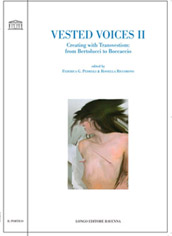

| L029006
 Vested Voices II Creating with Transvestism: from Bertolucci to Boccaccio, 2007 a cura di Federica G. Pedriali - Rossella Riccobono Il Portico n. 141 pp. 168, ISBN 978-88-8063-549-9 € 18.00 tramite Casalini Libri Digital Division Prefacing voices, by F.G. Pedriali and R. Riccobono – B. Luciano, The Transcultural / Transvestite Gaze of the Italian Cinema of the ’90s: Soldini, Özpetek, Bertolucci – N. Pireddu, Passing for Europe: Linguistic Transvestism and Transnational Identities in Marani’s «Nuova grammatica finlandese » – C. Gubbiotti, Travestitismo d’avanguardia – C. Nocentini, «Saio o bikini? Vada per l’armatura». Esplorazioni di guardaroba del Calvino degli anni ’50 – R. Riccobono, Vestirsi, svestirsi, travestirsi: arte e gioco della voce pavesiana – S. Wood, Re-dressing the Balance: Gender and Genre in Elsa Morante – F.G. Pedriali, Onnipotenziali e monacati: Manzoni, Verga, Gadda – T. Stein, «Gender» e classicismo nelle rime di Antonio Tebaldeo – J. Usher, Age Concern in Petrarch – S. Barsella, Travestimento autorale e autorità narrativa nella cornice del «Decameron». |
For Thomas More Utopia is an existential, social, political ideal place we all aim to reach. But it is an island. It is that island that one will reach if one embarks on a trip, by sea, by land, by outer space (and here a glimpse of Fellini’s 8 e 1/2 springs to mind). A trip that is illusory, as Utopia cannot be reached – and indeed no-one ever will reach it, because, in fact, it has already been lost. We have all been there, each of us has already experienced it. Utopia thus rests in the past and not in the future, and so our trip to this Edenic place (the place of the original unity, but also the time when we were in congruent communication with our most authentic Self, the god within us: when we were, in Gadda’s words, omnipotent) must be a trip backwards. A return trip to and through the fathers and mothers, not to reach unity again, but to accept its loss, returning to ourselves as healed as one can be, if ever can be, but with awareness. It is exactly in this return trip that the essence of this volume lies – a trip backwards in time and through artistic efforts. A trip within the self, to deconstruct and reconstruct the self. So that it may come to terms with the Self. Thus utopia (strictly in small letters) can be destabilised as lay, as democratically part of us all – ultimately as nostalgia.